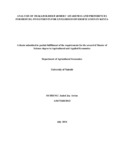| dc.description.abstract | Poverty continues to be a problem in some parts of the world and is typically severe among small-scale farmers. Biofuel investments are emerging as a possible alternative livelihood diversification strategy. However, little is known on farmers’ awareness and preferences for biofuel investments. Specifically, the study focused on characterization of smallholder farmers’ livelihood strategies, their awareness and preferences for biofuel investments. The survey data was generated from a multistage area sample of smallholder farmers in Western Kenya. Descriptive statistics were used in the characterization of smallholder farmers’ livelihood strategies. A binomial logit was applied to assess the factors that would influence the probability of farmers being aware of biofuel investments. Further, the Choice Experiment (CE) approach and the Random Parameter Logit (RPL) were used to elicit farmers’ preferences for biofuel investments.
The results of the study showed that majority of the farmers depend on agricultural-based livelihood activities that face major economic challenges such as low and delayed payments. Only about 41% of the farmers were aware about biofuel investments as a possible alternative livelihood strategy. The main factors that had a significant effect on the level of awareness were age of the household head, gender of the household head, education of the household head, membership to farmer group by the household head, access to extension services and the household size. Pooled results from the preference analysis indicated that farmers had positive preference for short contract length, quarter piece of land to be leased out, permanent type of employment and renewable contracts. The study also estimated Compensating Surplus (CS) measures, which indicated that farmers in Kakamega are willing to accept higher compensation compared to their counterparts in Bungoma for them to participate in biofuel investments. These findings offer useful insights to policy-makers on the design of biofuel investments to address the livelihood challenges in Western Kenya and other areas with similar conditions. | en_US |

